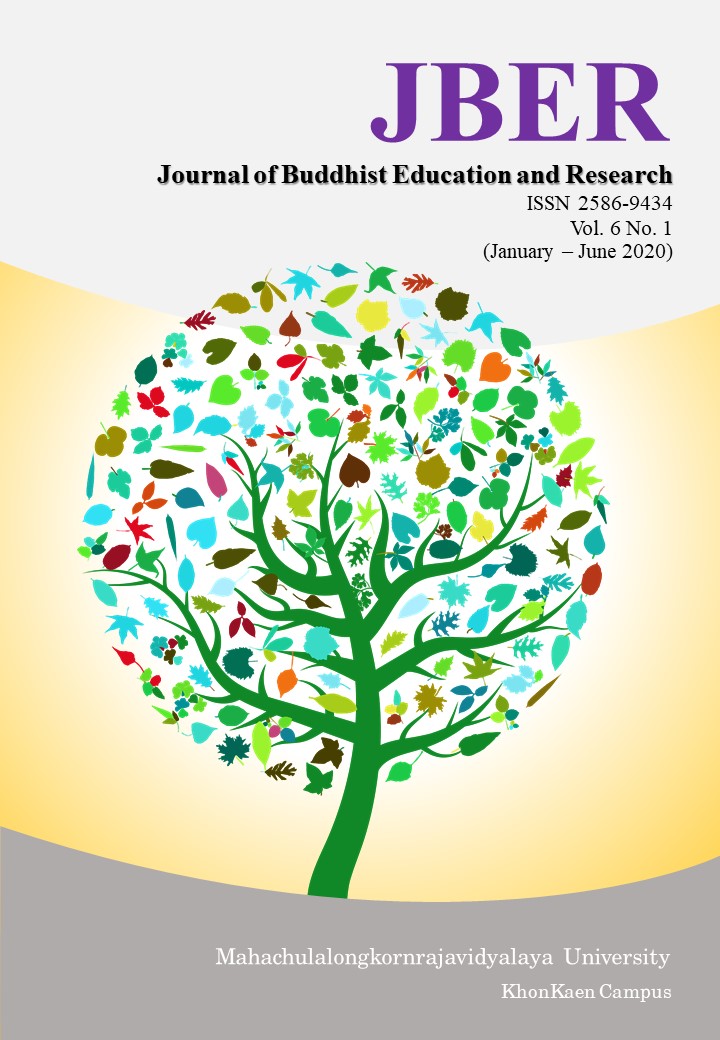การจัดการเรียนรู้ตามหลักอิทธิบาท 4 โรงเรียนพระปริยัติธรรม แผนกสามัญศึกษา ระดับมัธยมศึกษาตอนต้น จังหวัดอุบลราชธานี
คำสำคัญ:
การจัดการเรียนรู้, หลักอิทธิบาท ๔, โรงเรียนพระปริยัติธรรม แผนกสามัญศึกษาบทคัดย่อ
การวิจัยครั้งนี้มีวัตถุประสงค์ เพื่อศึกษาสภาพ เปรียบเทียบ และเสนอแนวทางการจัดการเรียนรู้ตามหลักอิทธิบาท 4 โรงเรียนพระปริยัติธรรมแผนกสามัญศึกษา ระดับมัธยม ศึกษาตอนต้น จังหวัดอุบลราชธานี ระเบียบวิธีวิจัยเป็นรูปแบบวิธีวิทยาการวิจัยแบบผสม ในการวิจัยเชิงปริมาณ กลุ่มตัวอย่าง ได้แก่ ครูบรรพชิต จำนวน 38 รูป และครูคฤหัสถ์ จำนวน 32 คน จากโรงเรียนพระปริยัติธรรมแผนกสามัญศึกษา จังหวัดอุบลราชธานี ซึ่งได้จากการกำหนดขนาดของกลุ่มตัวอย่างตามตารางของ Krejcie and Morgan โดยการสุ่มแบบง่าย เครื่องมือที่ใช้ในการวิจัยเป็นแบบสอบถามและแบบสัมภาษณ์ สถิติที่ใช้ในการวิเคราะห์ข้อมูล ใช้ค่าความถี่ และหาค่าร้อยละ และค่าส่วนเบี่ยงเบนมาตรฐาน ทดสอบด้วยค่าที (t-test independent) และการทดสอบเอฟ (F-test) ส่วนการวิจัยเชิงคุณภาพ กำหนดกลุ่มเป้า หมาย 15 รูป/คน โดยการเลือกแบบเจาะจง เครื่องมือเก็บขอมูลเป็นแบบสัมภาษณ์เชิงลึกโดยการวิเคราะห์ข้อมูลเชิงพรรณา และเขียนในลักษณะความเรียงประกอบบริบท (Content Analysis Techniques)
ผลการวิจัยพบว่า
1. สภาพการจัดการเรียนรู้ตามหลักอิทธิบาท 4 โรงเรียนพระปริยัติธรรมแผนกสามัญศึกษา ระดับมัธยมศึกษาตอนต้น จังหวัดอุบลราชธานี นั้น โดยภาพรวม อยู่ในระดับมาก เรียงจากมากไปหาน้อย ได้ ดังนี้ 1) ด้านวิมังสา (ความไตร่ตรอง) 2) ด้านฉันทะ (ความพอใจ) 3) ด้านจิตตะ (ความคิด) 4) ด้านฉันทะ (ความพอใจ) ตามลำดับ
2. ผลการเปรียบเทียบระดับการปฏิบัติต่อการจัดการเรียนรู้ตามหลักอิทธิบาท 4 โรงเรียนพระปริยัติธรรมแผนกสามัญศึกษา ระดับมัธยมศึกษาตอนต้น จังหวัดอุบลราชธานี จำแนกตามสถานภาพ โดยภาพรวม มีระดับการปฏิบัติไม่แตกต่างกัน และเมื่อแยกเป็นรายด้าน คือ ด้านวิริยะ (ความพากเพียร) มีระดับการปฏิบัติที่แตกต่างกันอย่างมีนัยสำคัญทางสถิติที่ระดับ 0.05 ซึ่งสอดคล้องกับสมมติฐานที่ตั้งไว้ จำแนกตามวุฒิการศึกษา โดยภาพรวม มีระดับการปฏิบัติไม่แตกต่างกัน และเมื่อแยกเป็นรายด้าน คือ ด้านวิริยะ (ความพากเพียร) มีระดับการปฏิบัติที่แตกต่างกันอย่างมีนัยสำคัญทางสถิติที่ระดับ 0.05 ซึ่งสอดคล้องตามสมมติฐานที่ตั้งไว้ และจำแนกตามประสบการณ์การทำงาน โดยภาพรวมมีระดับการปฏิบัติไม่แตกต่างกัน เมื่อแยกเป็นรายด้าน ด้านจิตตะ (ความคิด) มีระดับการปฏิบัติที่แตกต่างกันอย่างมีนัยสำคัญทางสถิติที่ระดับ 0.05 ซึ่งสอดคล้องตามสมมติฐานที่ตั้งไว้
3. แนวข้อเสนอแนะในการพัฒนาการจัดการเรียนรู้ตามหลักอิทธิบาท 4 โรงเรียนพระปริยัติธรรมแผนกสามัญศึกษา ระดับมัธยมศึกษาตอนต้น จังหวัดอุบลราชธานี จากข้อเสนอแนะการจัดการเรียนรู้ในแต่ละข้อดังนี้ 3.1) ฉันทะ (ความพอใจ) ควรมุ่งเน้นจัดการเรียนรู้นักเรียนตระหนักและสนใจในการเรียน เกิดความอยากรู้อยากเรียน 3.2) ด้านวิริยะ (ความพากเพียร) ควรมุ่งเน้นจัดการเรียนรู้ที่หลากหลายกระตุ้นผู้เรียนอยากเรียนรู้ 3.3) ด้านจิตตะ (ความคิด) ควรมุ่งเน้นสอนให้ผู้เรียนรู้จักคิดวิเคราะห์ คิดสร้างสรรค์ คิดอย่างมีเหตุผล เป็นระบบ และมีแบบแผน 3.4) ด้านวิมังสา (ความไตร่ตรอง) ควรมุ่งเน้นสอนให้นักเรียนใช้ปัญญาแก้ไขปัญหาต่างๆ อย่างมีเหตุผล
เอกสารอ้างอิง
ไทยรัฐฉบับพิมพ์. (2563). ปั้นเยาวชนให้มีความรู้คู่คุณธรรม. สืบค้นเมื่อ 15 มีนาคม 2562.จาก https://www.thairath.co.th/news/society/1799619.
พชร แสงเพชร. (2558). การจัดการเรียนรู้เพื่อพัฒนาคุณลักษณะอันพึงประสงค์ของนักเรียนตามหลักอิทธิบาท 4 โรงเรียนพระปริยัติธรรม แผนกสามัญศึกษา กลุ่มที่ 1 กรุงเทพมหานคร. วิทยานิพนธ์พุทธศาสตรมหาบัณฑิต สาขาวิชาพระพุทธศาสนา. มหาวิทยาลัยมหาจุฬาลงกรณราชวิทยาลัย.
พระมหาฉัตรชัย ธมฺมวรเมธี (ทันบาล). (2560). ศึกษาการจัดการเรียนการสอนตามหลักอิทธิิบาท 4 สำหรับนักเรียนระดับชั้นมัธยมศึกษาตอนปลาย เขตดอนเมือง กรุงเทพมหานคร. วิทยานิพนธ์พุทธศาสตรมหาบัณฑิต สาขาวิชาการสอนสังคมศึกษา. มหาวิทยาลัยมหาจุฬาลงกรณราชวิทยาลัย.
พระมหาบรรจง ติสรโณ (ศรีสุข). (2560). ศึกษาการประยุกต์ใช้หลักอิทธิบาทธรรม 4 ในการจัดการเรียนการสอนของโรงเรียนปริยัติคุณรสวิทยา อำเภอเมืองสุรินทร์ จังหวัดสุรินทร์. วิทยานิพนธ์พุทธศาสตรมหาบัณฑิต. มหาวิทยาลัยมหาจุฬาลงกรณราชวิทยาลัย.
ไพฑูรย์ พิมดี และคณะ. (2560). การพัฒนาการศึกษาภายใต้กรอบประเทศไทย 4.0 สู่ศตวรรษที่ 21. วารสารครุศาสตร์อุตสาหกรรม. 16(2), 199-206.
ลักขณา สิริวัฒน์. (2559). การประยุกต์ใช้อิทธิบาท 4 ในการจัดการเรียนรู้ที่เน้นผู้เรียนเป็นสำคัญของครูระดับประถมศึกษา. วารสารศึกษาศาสตร์ มหาวิทยาลัยมหาสารคาม. 10(2), 163-170.
สำนักเขตการศึกษาพระปริยัติธรรมแผนกสามัญศึกษา เขต 2. (2562). หลักสูตรพระปริยัติธรรม. สืบค้นเมื่อ 15 มีนาคม 2562. จาก https://www.debsecond.org.
Krejcie, R. V. & Morgan, D. W. (1970). Determining Sample Size for Research
Activities.Educational and Psychological Measurement.





